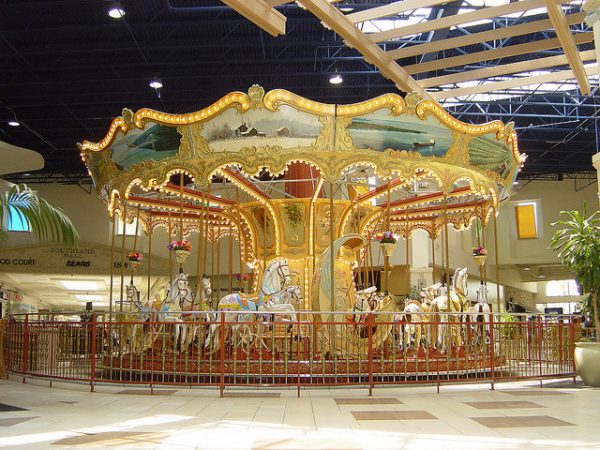Are Workplaces Destroying Leisure By Keeping Us Out of Shopping Centers?

Photo credit: Ruth Hara, CC BY 2.0.
Let’s end the week with a story about work and leisure:
With the rise of the internet, shopping came to look like work, and work, in many instances, came to look like leisure, which is why WeWork’s purchase of the Lord & Taylor building has a resonance beyond the obvious. WeWork leases office space to small but growing companies, giving them shared access to communal rooms that look like lounges with bars, air-hockey tables, lemon-infused water and so on.
That’s from the NYT’s “Lord & Taylor, WeWork, and the Death of Leisure,” and while I agree with its most obvious point—the workplace is now offering the social benefits that we used to find in public spaces—it seems to have missed the part where shopping is also work.
Yes, Lord & Taylor used to offer the same types of events and exhibits that WeWork now offers employees. Yes, malls used to be places where people went to hear pop bands, see fashion shows, and go ice-skating, and now certain types of tech companies schedule similar activities for their teams.
But shopping, though it is occasionally a form of leisure, is also time-consuming domestic work. Grocery shopping and meal planning is work. Buying gifts for family members is work. Buying well-fitting, appropriate clothes for yourself is work; buying clothes for your kids is even more work, especially when you bring the kids with you.
Putting a carousel or skating rink in the mall, or giving out free samples at Costco, is arguably the same thing as offering entertainment/sports/free food at the WeWork office—and before you say “but the Costco samples are there to get you to buy the full-size product,” you know as well as I do that certain offices get sponsored by certain snack companies for the exact same reason. (I’ve heard plenty of 99% Invisible podcast episodes where they thank NatureBox for providing their snacks.)
And yes, the fact that the NYT missed this might have to do with the consistent undervaluing of domestic labor, and it might also have to do with the fact that Lord & Taylor isn’t exactly “the mall,” even though they provide similar experiences to different socioeconomic groups with different shopping needs. (It’s interesting that author Ginia Bellafante describes shopping as “becoming work” only after the internet got involved, perhaps because more people are now tasked with reviewing and comparing items while managing the rest of their workday.)
Anyway, I’m sure I’ve made my argument by now. Go read the NYT article and see if you agree.
Support The Billfold
The Billfold continues to exist thanks to support from our readers. Help us continue to do our work by making a monthly pledge on Patreon or a one-time-only contribution through PayPal.
Comments